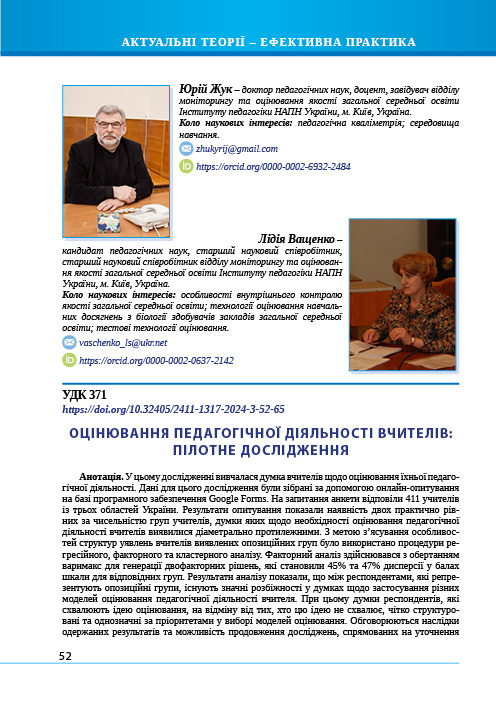Abstract
In this study, the opinion of teachers regarding the evaluation of their pedagogical activity was studied. Data for this study were collected using an online survey based on Google Forms software. 411 teachers from three regions of Ukraine answered the questionnaire. The results of the survey showed the existence of two groups of teachers almost equal in number, opinions about the need to evaluate the pedagogical activity of teachers are diametrically opposed. In order to find out the features of the structures of the teachers’ ideas of the identified opposition groups, regression, factor and cluster analysis procedures were used. Factor analysis was performed with varimax rotation to generate two-factor solutions that accounted for 47% of the variance in scale scores. The results of the analysis showed that among the respondents representing the opposition groups, there are significant differences of opinion regarding the application of different models of evaluation of the teacher’s pedagogical activity. At the same time, the opinions of respondents who approve of the idea of evaluation, in contrast to those who do not approve of this idea, are clearly structured and unambiguous in terms of priorities in the selection of evaluation models. The implications of the obtained results and the possibility of continuing research aimed at clarifying the structures of teachers’ submissions regarding the evaluation of their pedagogical activity using psychometric technologies are discussed.
References
Amrein-Beardsley, A. (2008). Methodological concerns about the education value-added assessment system. Educational researcher, 37(2), 65‒75.
Amrein-Beardsley, A., & Osborn Popp, S. E. (2012). Peer observations among faculty in a college of education: investigating the summative and formative uses of the Reformed Teaching Observation Protocol (RTOP). Educational Assessment, Evaluation and Accountability, 24, 5‒24.
Avalos, B., & Assael, J. (2006). Moving from resistance to agreement: the case of the Chilean teacher performance evaluation. International Journal of Educational Research, 45(4), 254–266.
Collins, A. B. (2004). Teacher performance evaluation: A stressful experience from a private secondary school. Educational Research, 46(1), 43‒54.
Corcoran, S. P. (2010). Can Teachers Be Evaluated by Their Students’ Test Scores? Should They Be? The Use of Value-Added Measures of Teacher Effectiveness in Policy and Practice. Education Policy for Action Series. Annenberg Institute for School Reform at Brown University (NJ1).
Datnow, A., & Castellano, M. (2000). Teachers’ responses to Success for All: How beliefs, experiences, and adaptations shape implementation. American Educational Research Journal, 37(3), 775‒799.
Davis, D. R., Pool, J. E., & Mits-Cash, M. (2000). Issues in implementing a new teacher assessment system in a large urban school district: Results of a qualitative field study. Journal of Personnel Evaluation in Education, 14, 285‒306.
Glazerman, S., Goldhaber, D., Loeb, S., Raudenbush, S., Staiger, D. O., Whitehurst, G. J., & Croft, M. (2011). Passing muster: Evaluating teacher evaluation systems. Brown Center on Education Policy at Brookings. Report No. 6971.
Goe, L., & Croft, A. (2009). Methods of Evaluating Teacher Effectiveness. Research-to-Practice Brief. National Comprehensive Center for Teacher Quality.
Goe, L., Bell, C., & Little, O. (2008). Approaches to evaluating teacher effectiveness: A research synthesis. National Comprehensive Center for Teacher Quality.
Heneman, H. G., & Milanowski, A. T. (2003). Continuing assessment of teacher reactions to a standards-based teacher evaluation system. Journal of Personnel evaluation in Education, 17, 173‒195.
Jiang, J. Y., Sporte, S. E., & Luppescu, S. (2015). Teacher perspectives on evaluation reform: Chicago’s REACH students. Educational Researcher, 44(2), 105‒116.
Johnson, B., & Christensen, L. B. (2017). Educational research: Quantitative, qualitative, and mixed approaches. Thousand Oaks, Calif: SAGE Publications.
Martínez, J. F., Schweig, J., & Goldschmidt, P. (2016). Approaches for combining multiple measures of teacher performance: Reliability, validity, and implications for evaluation policy. Educational Evaluation and Policy Analysis, 38(4), 738‒756.
Martínez, J.F., Fernández, M.P. (2021). Teacher Evaluation with Multiple Indicators: Conceptual and Methodological Considerations Regarding Validity. In: Manzi, J., García, M.R., Taut, S. (Eds), Validity of Educational Assessments in Chile and Latin America. Springer, Cham. https://doi.org/10.1007/978-3-030-78390-7_16
Milanowski, A. T., & Heneman, H. G. (2001). Assessment of teacher reactions to a standards-based teacher evaluation system: A pilot study. Journal of Personnel Evaluation in Education, 15, 193‒212.
Ong, Y.S., Koh, J., Tan, AL. et al. (2024). Developing an Integrated STEM Classroom Observation Protocol Using the Productive Disciplinary Engagement Framework. Research in Science Education, 54(1), 101–118. https://doi.org/10.1007/s11165-023-10110-z
Ravert, R. D., Gomez-Scott, J., & Donnellan, M. B. (2015). Equivalency of paper versus tablet computer survey data. Educational Researcher, 44 (5), 308. doi: 10.3102/0013189X15592845
Reddy, L. A., Dudek, C. M., Peters, S., Alperin, A., Kettler, R. J., & Kurz, A. (2018). Teachers’ and school administrators’ attitudes and beliefs of teacher evaluation: A preliminary investigation of high poverty school districts. Educational Assessment, Evaluation and Accountability, 30, 47‒70.
Tschannen-Moran, M., & Hoy, A. W. (2001). Teacher efficacy: Capturing an elusive construct. Teaching and teacher education, 17(7), 783‒805.
Tuytens, M., & Devos, G. (2009). Teachers’ perception of the new teacher evaluation policy: A validity study of the Policy Characteristics Scale. Teaching and Teacher Education, 25(6), 924‒930.
Tuytens, M., Devos, G. & Vanblaere, B. (2020). An integral perspective on teacher evaluation: a review of empirical studies. Educational Assessment, Evaluation and Accountability, 32, 153–183 https://doi.org/10.1007/s11092-020-09321-z

This work is licensed under a Creative Commons Attribution-NonCommercial-ShareAlike 4.0 International License.


